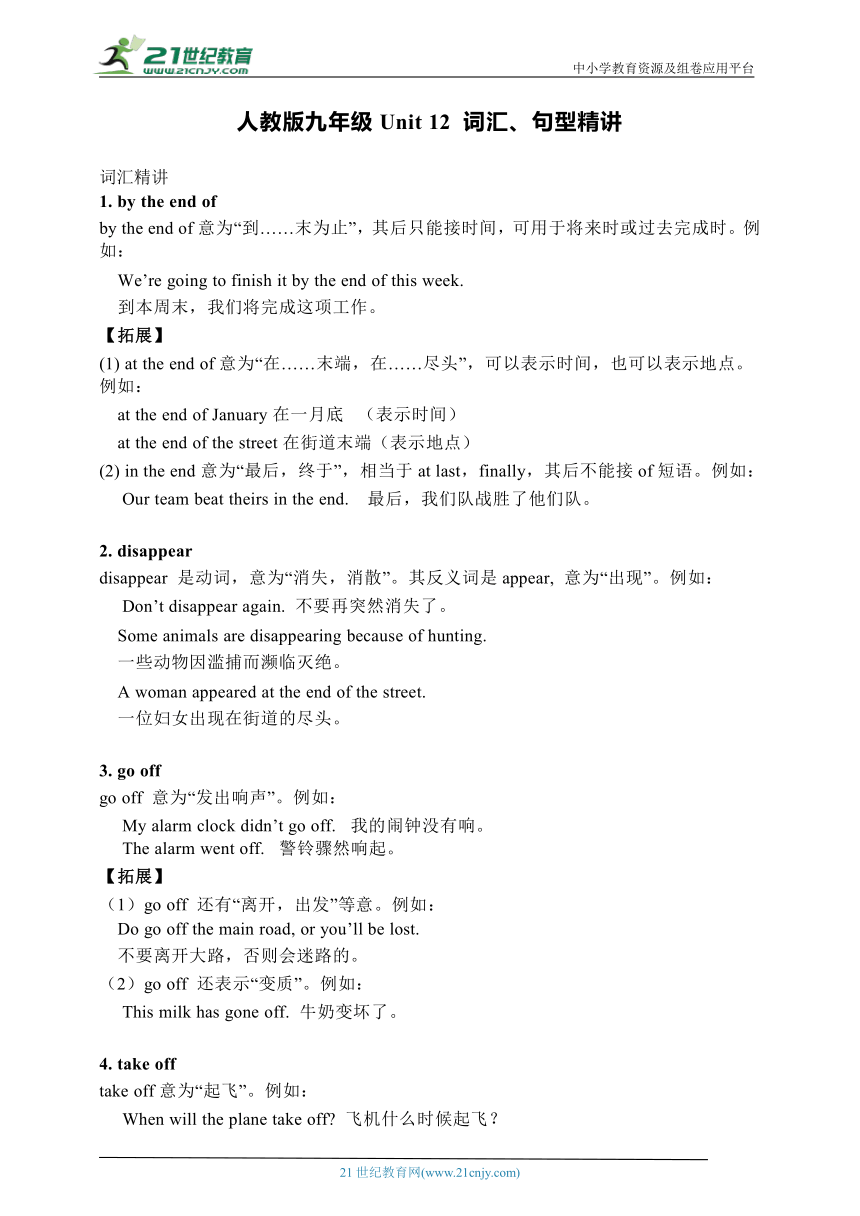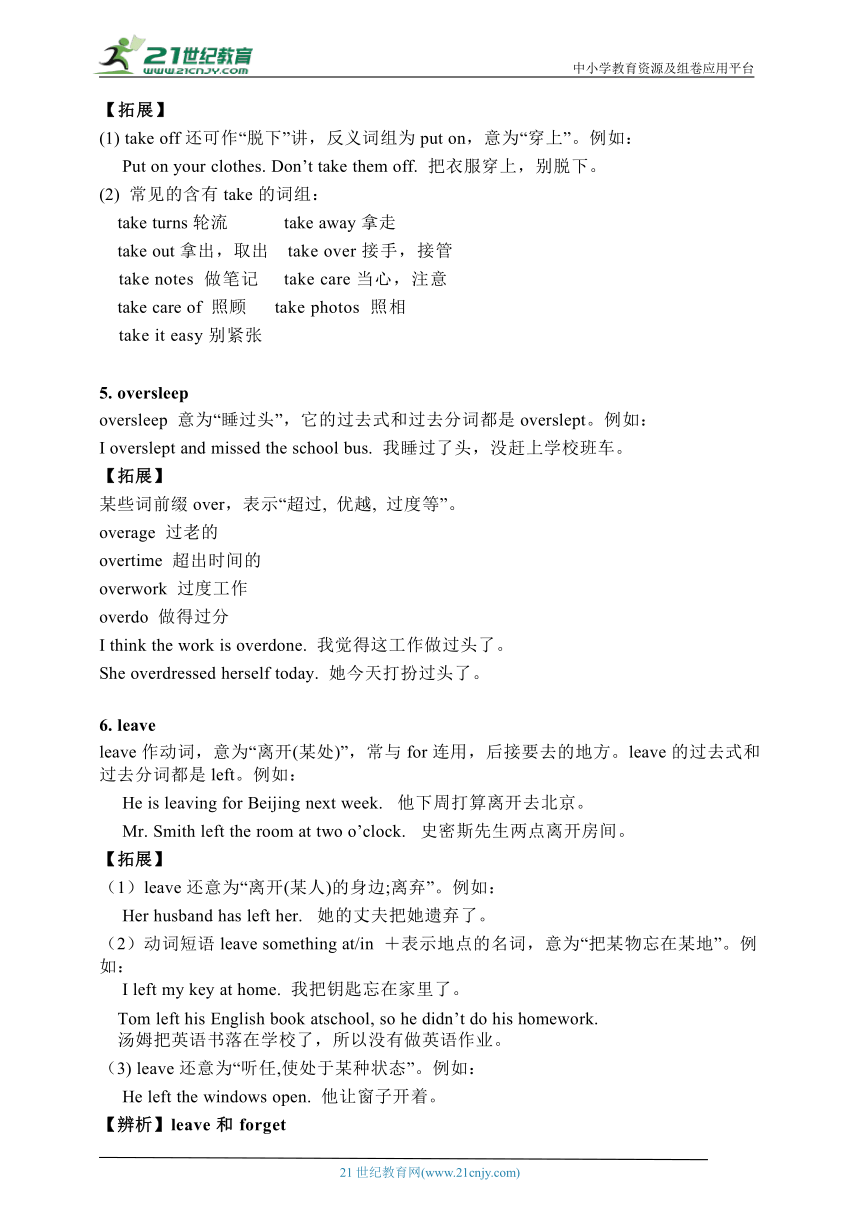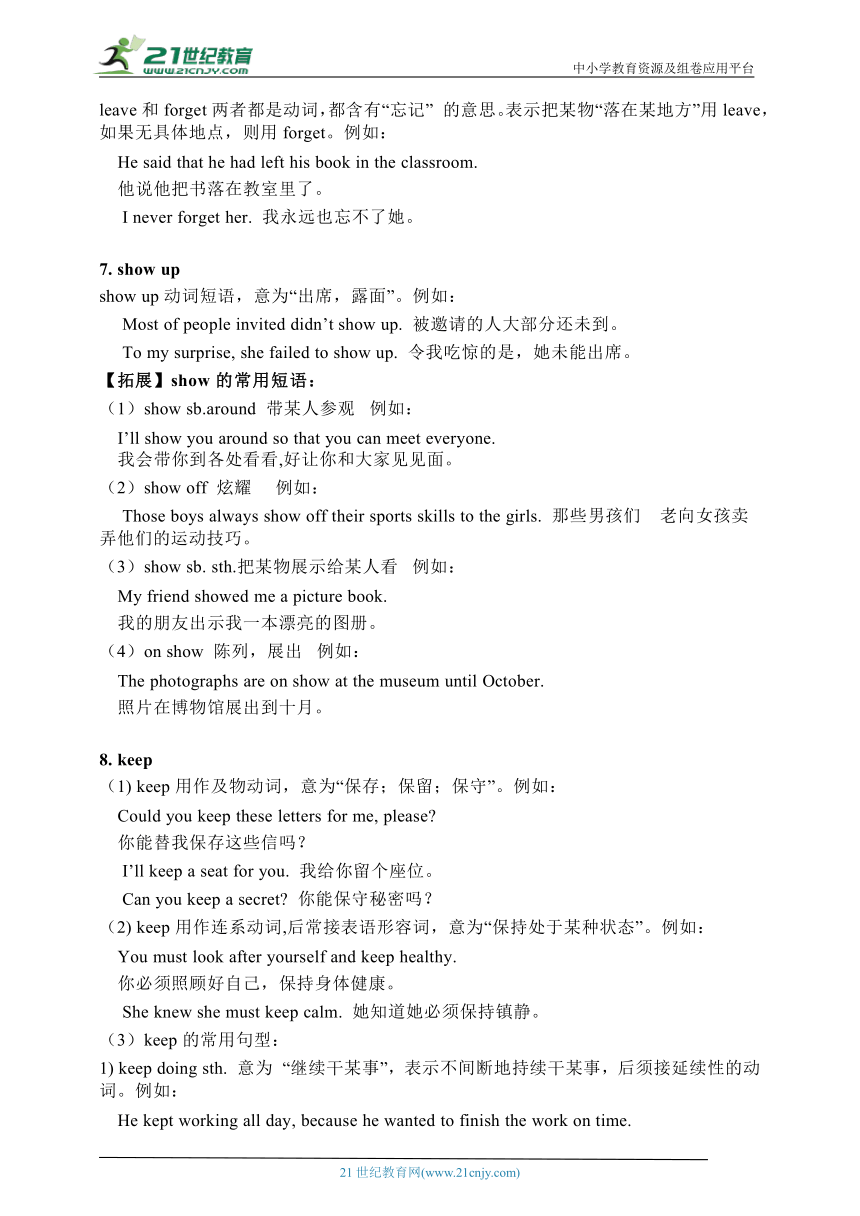Unit 12 词汇句型精讲 (新目标九年级Unit 12 Life is full of the unexpected)
文档属性
| 名称 | Unit 12 词汇句型精讲 (新目标九年级Unit 12 Life is full of the unexpected) |  | |
| 格式 | doc | ||
| 文件大小 | 281.9KB | ||
| 资源类型 | 试卷 | ||
| 版本资源 | 人教新目标(Go for it)版 | ||
| 科目 | 英语 | ||
| 更新时间 | 2023-08-31 21:21:01 | ||
图片预览



文档简介
中小学教育资源及组卷应用平台
人教版九年级Unit 12 词汇、句型精讲
词汇精讲
1. by the end of
by the end of意为“到……末为止”,其后只能接时间,可用于将来时或过去完成时。例如:
We’re going to finish it by the end of this week.
到本周末,我们将完成这项工作。
【拓展】
(1) at the end of意为“在……末端,在……尽头”,可以表示时间,也可以表示地点。例如:
at the end of January在一月底 (表示时间)
at the end of the street在街道末端(表示地点)
(2) in the end意为“最后,终于”,相当于at last,finally,其后不能接of短语。例如:
Our team beat theirs in the end. 最后,我们队战胜了他们队。
2. disappear
disappear 是动词,意为“消失,消散”。其反义词是appear, 意为“出现”。例如:
Don’t disappear again. 不要再突然消失了。
Some animals are disappearing because of hunting.
一些动物因滥捕而濒临灭绝。
A woman appeared at the end of the street.
一位妇女出现在街道的尽头。
3. go off
go off 意为“发出响声”。例如:
My alarm clock didn’t go off. 我的闹钟没有响。
The alarm went off. 警铃骤然响起。
【拓展】
(1)go off 还有“离开,出发”等意。例如:
Do go off the main road, or you’ll be lost.
不要离开大路,否则会迷路的。
(2)go off 还表示“变质”。例如:
This milk has gone off. 牛奶变坏了。
4. take off
take off意为“起飞”。例如:
When will the plane take off 飞机什么时候起飞?
【拓展】
(1) take off还可作“脱下”讲,反义词组为put on,意为“穿上”。例如:
Put on your clothes. Don’t take them off. 把衣服穿上,别脱下。
(2) 常见的含有take的词组:
take turns轮流 take away拿走
take out拿出,取出 take over接手,接管
take notes 做笔记 take care当心,注意
take care of 照顾 take photos 照相
take it easy别紧张
5. oversleep
oversleep 意为“睡过头”,它的过去式和过去分词都是overslept。例如:
I overslept and missed the school bus. 我睡过了头,没赶上学校班车。
【拓展】
某些词前缀over,表示“超过, 优越, 过度等”。
overage 过老的
overtime 超出时间的
overwork 过度工作
overdo 做得过分
I think the work is overdone. 我觉得这工作做过头了。
She overdressed herself today. 她今天打扮过头了。
6. leave
leave作动词,意为“离开(某处)”,常与for连用,后接要去的地方。leave的过去式和过去分词都是left。例如:
He is leaving for Beijing next week. 他下周打算离开去北京。
Mr. Smith left the room at two o’clock. 史密斯先生两点离开房间。
【拓展】
(1)leave还意为“离开(某人)的身边;离弃”。例如:
Her husband has left her. 她的丈夫把她遗弃了。
(2)动词短语leave something at/in +表示地点的名词,意为“把某物忘在某地”。例如:
I left my key at home. 我把钥匙忘在家里了。
Tom left his English book atschool, so he didn’t do his homework.
汤姆把英语书落在学校了,所以没有做英语作业。
(3) leave还意为“听任,使处于某种状态”。例如:
He left the windows open. 他让窗子开着。
【辨析】leave和forget
leave和forget两者都是动词,都含有“忘记” 的意思。表示把某物“落在某地方”用leave,如果无具体地点,则用forget。例如:
He said that he had left his book in the classroom.
他说他把书落在教室里了。
I never forget her. 我永远也忘不了她。
7. show up
show up动词短语,意为“出席,露面”。例如:
Most of people invited didn’t show up. 被邀请的人大部分还未到。
To my surprise, she failed to show up. 令我吃惊的是,她未能出席。
【拓展】show的常用短语:
(1)show sb.around 带某人参观 例如:
I’ll show you around so that you can meet everyone.
我会带你到各处看看,好让你和大家见见面。
(2)show off 炫耀 例如:
Those boys always show off their sports skills to the girls. 那些男孩们 老向女孩卖弄他们的运动技巧。
(3)show sb. sth.把某物展示给某人看 例如:
My friend showed me a picture book.
我的朋友出示我一本漂亮的图册。
(4)on show 陈列,展出 例如:
The photographs are on show at the museum until October.
照片在博物馆展出到十月。
8. keep
(1) keep用作及物动词,意为“保存;保留;保守”。例如:
Could you keep these letters for me, please
你能替我保存这些信吗?
I’ll keep a seat for you. 我给你留个座位。
Can you keep a secret 你能保守秘密吗?
(2) keep用作连系动词,后常接表语形容词,意为“保持处于某种状态”。例如:
You must look after yourself and keep healthy.
你必须照顾好自己,保持身体健康。
She knew she must keep calm. 她知道她必须保持镇静。
(3)keep的常用句型:
1) keep doing sth. 意为 “继续干某事”,表示不间断地持续干某事,后须接延续性的动词。例如:
He kept working all day, because he wanted to finish the work on time.
他整天都在不停地工作,因为他想准时完成工作。
2)keep on doing sth. 意为“持续做某事”。例如:
The pupil kept on asking me the same question.
这个学生不断地问我同一个问题。例如:
3) keep...from doing sth.意为“阻止/防止……做某事”。例如:
The heavy snow kept us from going out.
大雪阻止了我们出去。
句型精讲
1.Life is full of the unexpected.
be full of意为“充满”,相当于be filled with。例如:
The glass is full of water.=The glass is filled with water.
杯子里装满了水。
The classroom is full of different boys and girls.
教室里挤满了不同的男孩女孩。
2. And by the time I got up , my brother had already gotten in the shower.
(1)by the time的意思是“到……时间为止”,强调时间的截止,引导时间状语从句。By the time+过去的时间,主句一般用过去完成时,表示在从句谓语动作前已经完成。例如:
By the time I got there, the bus had already left.
不晚于我到那里时,公共汽车已经开走了。
(2)当时间状语为by the end of last month/year/week时,主句也用过去完成时。例如:
By the end of last month we had learned 20 English songs.
到上一个月我们已经学习了20首英语歌曲。
【拓展】
(1)过去完成时的概念:
过去完成时表示一个动作或者状态在过去某一个时间或者动作之前已经完成或结束,也可以说是“过去的过去”。它的结构是:had+动词的过去分词,had用于各种人称和数,即had没有人称和数的变化。
(2)过去完成时的否定和疑问句式:
过去完成时的否定句是在had的后面直接加not;过去完成时的一般疑问句是直接把had移到句首。它的肯定回答是:Yes,I had. 否定回答是:No, I hadn’t. 例如:
He hadn’t finished his homework before I came back.
在我回来之前,他没有完成作业。
—Had you finished your homework by the time your mother came back
到你妈妈回来的时候,你完成你的家庭作业了吗?
—Yes,I had. 是的,完成了。
3. What happened to Dave on April Fool’s Day
(1)happen是不及物动词,意思是“发生”,和动词短语takeplace是同义词。它们共同特点是: 都是不及物动词,没有被动语态形式;都是非延续性动词,不能和表示一段时间的状语连用。它们的不同点是:happen是表示偶然性的、出乎意料之外的事情发生;takeplace表示必然性的发生或者计划、策划好的事情发生。例如:
What happened to you on the road yesterday
昨天晚上你在路上发生什么事情?
Great changes have taken place in China since 1978.
自1978年以来中国发生了巨大的变化。
(2) happen构成的动词短语有:happen to somebody 表示“(某事)发生在某人的身上”。happen to do something=do something by accident 表示“偶然做某事”的意思。例如:
An accident happened to him after drinking too much.
他喝醉酒之后发生了一场事故。
I happened to meet your mother yesterday.
昨天我偶然遇见你的妈妈。
4. Welles made it sound so real that hundreds of people believed the story …
so...that意思是“如此……以至于……”,中间用形容词或者副词,so修饰词形容词或副词,形容词后一般没有名词,that的后面是表示结果的状语从句。而同义短语such...that的中间有名词,such修饰此名词。例如:
Our teacher is so kind that all of us like him.
我们的老师是如此好心以至于我们都喜欢他。
He runs so fast that nobody in my class can catch up with him.
他跑得那么快,我们班没有人能追上他。
It is such an interesting film that all of us like it.
它是一部如此有兴趣的电影以至于我们都喜欢它。
He had such long arms that he could almost touch his knees.
他的胳膊很长,几乎就能够到他的膝盖。
【注意】
如果名词前的形容词是表示数量的few、little、many、much仍要用so修饰。例如:
There are so many people in the room that we could not get in.
房间里那么多的人,我们都进不去。
【拓展】
so that意思是“以便于、为了”,引导表示目的的状语从句。例如:
We got up early this morning so that we can catch the first bus.
我们今天早上起床很早是为了能赶上第一班公共汽车。
5. As I was waitingin line with other office workers, I heard…
as是连词,意为“当……时候”,引导时间状语从句,强调两个动作同时发生;或某事发生的过程中另一件事发生;或某事一发生,另一件事立即发生。例如:
We walked into the garden as the music stopped.
音乐声一停,我们就走进了花园。
【拓展】
as的用法颇多,现将所学的其他用法归纳如下:
(1) as作连词:
1) “像……一样、如……”,常用于比较状语从句或方式状语从句。例如:
I can’t run as fast as I used to. 我跑得不如过去那样快。
You must do everything as I do. 你必须按照我做的那样去做每件事。
2) “因为,既然”,引导原因状语从句。例如:
As we are both tired, let’s stop to have a rest.
既然我们都累了,让我们停下来休息会吧。
3) “正如,照……方法”,常引导非限制性定语从句。例如:
As we all know, the earth travels around the sun.
众所周知,地球绕着太阳转。
(2)as作介词,意为“好像;作为、当作”。例如:
I work in Beijing as a guider 我在北京当导游。
21世纪教育网 www.21cnjy.com 精品试卷·第 2 页 (共 2 页)
21世纪教育网(www.21cnjy.com)
人教版九年级Unit 12 词汇、句型精讲
词汇精讲
1. by the end of
by the end of意为“到……末为止”,其后只能接时间,可用于将来时或过去完成时。例如:
We’re going to finish it by the end of this week.
到本周末,我们将完成这项工作。
【拓展】
(1) at the end of意为“在……末端,在……尽头”,可以表示时间,也可以表示地点。例如:
at the end of January在一月底 (表示时间)
at the end of the street在街道末端(表示地点)
(2) in the end意为“最后,终于”,相当于at last,finally,其后不能接of短语。例如:
Our team beat theirs in the end. 最后,我们队战胜了他们队。
2. disappear
disappear 是动词,意为“消失,消散”。其反义词是appear, 意为“出现”。例如:
Don’t disappear again. 不要再突然消失了。
Some animals are disappearing because of hunting.
一些动物因滥捕而濒临灭绝。
A woman appeared at the end of the street.
一位妇女出现在街道的尽头。
3. go off
go off 意为“发出响声”。例如:
My alarm clock didn’t go off. 我的闹钟没有响。
The alarm went off. 警铃骤然响起。
【拓展】
(1)go off 还有“离开,出发”等意。例如:
Do go off the main road, or you’ll be lost.
不要离开大路,否则会迷路的。
(2)go off 还表示“变质”。例如:
This milk has gone off. 牛奶变坏了。
4. take off
take off意为“起飞”。例如:
When will the plane take off 飞机什么时候起飞?
【拓展】
(1) take off还可作“脱下”讲,反义词组为put on,意为“穿上”。例如:
Put on your clothes. Don’t take them off. 把衣服穿上,别脱下。
(2) 常见的含有take的词组:
take turns轮流 take away拿走
take out拿出,取出 take over接手,接管
take notes 做笔记 take care当心,注意
take care of 照顾 take photos 照相
take it easy别紧张
5. oversleep
oversleep 意为“睡过头”,它的过去式和过去分词都是overslept。例如:
I overslept and missed the school bus. 我睡过了头,没赶上学校班车。
【拓展】
某些词前缀over,表示“超过, 优越, 过度等”。
overage 过老的
overtime 超出时间的
overwork 过度工作
overdo 做得过分
I think the work is overdone. 我觉得这工作做过头了。
She overdressed herself today. 她今天打扮过头了。
6. leave
leave作动词,意为“离开(某处)”,常与for连用,后接要去的地方。leave的过去式和过去分词都是left。例如:
He is leaving for Beijing next week. 他下周打算离开去北京。
Mr. Smith left the room at two o’clock. 史密斯先生两点离开房间。
【拓展】
(1)leave还意为“离开(某人)的身边;离弃”。例如:
Her husband has left her. 她的丈夫把她遗弃了。
(2)动词短语leave something at/in +表示地点的名词,意为“把某物忘在某地”。例如:
I left my key at home. 我把钥匙忘在家里了。
Tom left his English book atschool, so he didn’t do his homework.
汤姆把英语书落在学校了,所以没有做英语作业。
(3) leave还意为“听任,使处于某种状态”。例如:
He left the windows open. 他让窗子开着。
【辨析】leave和forget
leave和forget两者都是动词,都含有“忘记” 的意思。表示把某物“落在某地方”用leave,如果无具体地点,则用forget。例如:
He said that he had left his book in the classroom.
他说他把书落在教室里了。
I never forget her. 我永远也忘不了她。
7. show up
show up动词短语,意为“出席,露面”。例如:
Most of people invited didn’t show up. 被邀请的人大部分还未到。
To my surprise, she failed to show up. 令我吃惊的是,她未能出席。
【拓展】show的常用短语:
(1)show sb.around 带某人参观 例如:
I’ll show you around so that you can meet everyone.
我会带你到各处看看,好让你和大家见见面。
(2)show off 炫耀 例如:
Those boys always show off their sports skills to the girls. 那些男孩们 老向女孩卖弄他们的运动技巧。
(3)show sb. sth.把某物展示给某人看 例如:
My friend showed me a picture book.
我的朋友出示我一本漂亮的图册。
(4)on show 陈列,展出 例如:
The photographs are on show at the museum until October.
照片在博物馆展出到十月。
8. keep
(1) keep用作及物动词,意为“保存;保留;保守”。例如:
Could you keep these letters for me, please
你能替我保存这些信吗?
I’ll keep a seat for you. 我给你留个座位。
Can you keep a secret 你能保守秘密吗?
(2) keep用作连系动词,后常接表语形容词,意为“保持处于某种状态”。例如:
You must look after yourself and keep healthy.
你必须照顾好自己,保持身体健康。
She knew she must keep calm. 她知道她必须保持镇静。
(3)keep的常用句型:
1) keep doing sth. 意为 “继续干某事”,表示不间断地持续干某事,后须接延续性的动词。例如:
He kept working all day, because he wanted to finish the work on time.
他整天都在不停地工作,因为他想准时完成工作。
2)keep on doing sth. 意为“持续做某事”。例如:
The pupil kept on asking me the same question.
这个学生不断地问我同一个问题。例如:
3) keep...from doing sth.意为“阻止/防止……做某事”。例如:
The heavy snow kept us from going out.
大雪阻止了我们出去。
句型精讲
1.Life is full of the unexpected.
be full of意为“充满”,相当于be filled with。例如:
The glass is full of water.=The glass is filled with water.
杯子里装满了水。
The classroom is full of different boys and girls.
教室里挤满了不同的男孩女孩。
2. And by the time I got up , my brother had already gotten in the shower.
(1)by the time的意思是“到……时间为止”,强调时间的截止,引导时间状语从句。By the time+过去的时间,主句一般用过去完成时,表示在从句谓语动作前已经完成。例如:
By the time I got there, the bus had already left.
不晚于我到那里时,公共汽车已经开走了。
(2)当时间状语为by the end of last month/year/week时,主句也用过去完成时。例如:
By the end of last month we had learned 20 English songs.
到上一个月我们已经学习了20首英语歌曲。
【拓展】
(1)过去完成时的概念:
过去完成时表示一个动作或者状态在过去某一个时间或者动作之前已经完成或结束,也可以说是“过去的过去”。它的结构是:had+动词的过去分词,had用于各种人称和数,即had没有人称和数的变化。
(2)过去完成时的否定和疑问句式:
过去完成时的否定句是在had的后面直接加not;过去完成时的一般疑问句是直接把had移到句首。它的肯定回答是:Yes,I had. 否定回答是:No, I hadn’t. 例如:
He hadn’t finished his homework before I came back.
在我回来之前,他没有完成作业。
—Had you finished your homework by the time your mother came back
到你妈妈回来的时候,你完成你的家庭作业了吗?
—Yes,I had. 是的,完成了。
3. What happened to Dave on April Fool’s Day
(1)happen是不及物动词,意思是“发生”,和动词短语takeplace是同义词。它们共同特点是: 都是不及物动词,没有被动语态形式;都是非延续性动词,不能和表示一段时间的状语连用。它们的不同点是:happen是表示偶然性的、出乎意料之外的事情发生;takeplace表示必然性的发生或者计划、策划好的事情发生。例如:
What happened to you on the road yesterday
昨天晚上你在路上发生什么事情?
Great changes have taken place in China since 1978.
自1978年以来中国发生了巨大的变化。
(2) happen构成的动词短语有:happen to somebody 表示“(某事)发生在某人的身上”。happen to do something=do something by accident 表示“偶然做某事”的意思。例如:
An accident happened to him after drinking too much.
他喝醉酒之后发生了一场事故。
I happened to meet your mother yesterday.
昨天我偶然遇见你的妈妈。
4. Welles made it sound so real that hundreds of people believed the story …
so...that意思是“如此……以至于……”,中间用形容词或者副词,so修饰词形容词或副词,形容词后一般没有名词,that的后面是表示结果的状语从句。而同义短语such...that的中间有名词,such修饰此名词。例如:
Our teacher is so kind that all of us like him.
我们的老师是如此好心以至于我们都喜欢他。
He runs so fast that nobody in my class can catch up with him.
他跑得那么快,我们班没有人能追上他。
It is such an interesting film that all of us like it.
它是一部如此有兴趣的电影以至于我们都喜欢它。
He had such long arms that he could almost touch his knees.
他的胳膊很长,几乎就能够到他的膝盖。
【注意】
如果名词前的形容词是表示数量的few、little、many、much仍要用so修饰。例如:
There are so many people in the room that we could not get in.
房间里那么多的人,我们都进不去。
【拓展】
so that意思是“以便于、为了”,引导表示目的的状语从句。例如:
We got up early this morning so that we can catch the first bus.
我们今天早上起床很早是为了能赶上第一班公共汽车。
5. As I was waitingin line with other office workers, I heard…
as是连词,意为“当……时候”,引导时间状语从句,强调两个动作同时发生;或某事发生的过程中另一件事发生;或某事一发生,另一件事立即发生。例如:
We walked into the garden as the music stopped.
音乐声一停,我们就走进了花园。
【拓展】
as的用法颇多,现将所学的其他用法归纳如下:
(1) as作连词:
1) “像……一样、如……”,常用于比较状语从句或方式状语从句。例如:
I can’t run as fast as I used to. 我跑得不如过去那样快。
You must do everything as I do. 你必须按照我做的那样去做每件事。
2) “因为,既然”,引导原因状语从句。例如:
As we are both tired, let’s stop to have a rest.
既然我们都累了,让我们停下来休息会吧。
3) “正如,照……方法”,常引导非限制性定语从句。例如:
As we all know, the earth travels around the sun.
众所周知,地球绕着太阳转。
(2)as作介词,意为“好像;作为、当作”。例如:
I work in Beijing as a guider 我在北京当导游。
21世纪教育网 www.21cnjy.com 精品试卷·第 2 页 (共 2 页)
21世纪教育网(www.21cnjy.com)
同课章节目录
- Unit 1 How can we become good learners.
- Section A
- Section B
- Unit 2 I think that mooncakes are delicious!
- Section A
- Section B
- Unit 3 Could you please tell me where the restroom
- Section A
- Section B
- Unit 4 I used to be afraid of the dark.
- Section A
- Section B
- Unit 5 What are the shirts made of?
- Section A
- Section B
- Review of Units 1-5
- Unit 6 When was it invented?
- Section A
- Section B
- Unit 7 Teenagers should be allowed to choose their
- Section A
- Section B
- Unit 8 It must belong to Carla.
- Section A
- Section B
- Unit 9 I like music that I can dance to.
- Section A
- Section B
- Unit 10 You're supposed to shake hands.
- Section A
- Section B
- Review of Units 6-10
- Unit 11 Sad movies make me cry.
- Section A
- Section B
- Unit 12 Life is full of the unexpected
- Section A
- Section B
- Unit 13 We're trying to save the earth!
- Section A
- Section B
- Unit 14 I remember meeting all of you in Grade 7.
- Section A
- Section B
- Review of Units 11-14
